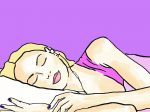You sit in an office, white LEDs blaring overhead, computer open before you. You are squinting at tiny words on the page. To catch grammar and spelling mistakes, you have to be able to see the smallest detail. You press on the little sun icon on your computer’s keyboard, but the brightness is already as high as it will go. You can feel the dark circles developing beneath your eyes, but the last article isn’t in yet. It could take a couple minutes, it could take an hour.
When you finally step out onto the street, the darkness wraps around you like a warm blanket. Only dim yellow street lights guide you as you trudge home. You’re so tired, so tired, but even when you collapse into bed, even in complete and total darkness, sleep refuses to claim you. You wait, 15 minutes, half an hour. It’s 2 a.m. You have to be up at 8 a.m. You finally capitulate and pop a melatonin. You’re asleep within five minutes.
It’s not an uncommon story — all my friends have their own stashes of melatonin, and I used it almost every night to cope with my inconsistent sleep schedule last year. I would take a melatonin at 2 a.m. when I got home from work, then wake up six hours later and wonder why I felt so hazy.
Many college students have difficulty sleeping, not only because of inconsistent sleeping schedules — all-nighters, anyone? — but also because of the ever-present stress that comes along with student life. In 2017, 60% of college students experienced poor sleep, while 7.7% met the criteria of an insomnia disorder, and it is unlikely that those numbers have improved.
It should come as no surprise, then, that many students are using melatonin regularly in an attempt to get a healthy amount of sleep on tight and stressful schedules that leave them with few alternatives. But what is melatonin actually doing to the bodies of all the sleep-deprived college students who have begun to depend upon it — and could it be harming more than it is helping?
Even though melatonin often comes packed neatly into a sweet fruit-flavored gummy, it is not a candy or even a vitamin — it’s a hormone. The human body produces melatonin naturally as a response to darkness, which is why extended exposure to screens or bright lights can inhibit this process. Essentially, the melatonin hormone puts you to sleep, and researchers also suspect that it plays a part in other bodily functions.
Melatonin has been shown to be effective for jet lag, delayed sleep-wake phase disorder, some sleep disorders in children and anxiety before or after surgery, but the results of studies regarding its use in treating insomnia have been mixed and inconclusive.
Even studies that show that melatonin is indeed effective also show that that effect is almost minimal enough to be negligible. One review of 15 studies found that melatonin allows the user to fall asleep an average of 3.9 minutes faster and stay asleep for 13 minutes longer.
These results should not be surprising considering that even if melatonin production is somewhat inhibited by bright screens, your body still produces much of the melatonin that it needs. The melatonin supplements tack on just a tiny bit more — a snowflake in the blizzard.
Most scientists agree that short-term use of melatonin is safe, but they also point out that overdosing can lead to grogginess and bad dreams. Other possible side effects include headaches, dizziness and nausea. The long-term side effects remain unknown.
Melatonin is the only hormone supplement available without a prescription in the United States. This means that it’s incredibly easy for busy students to pick up a bottle of melatonin gummies at the CVS down the street, but more importantly, it also means that melatonin is regulated by the FDA as a dietary supplement. Regulations for dietary supplements are much less strict than those for prescriptions or even over-the-counter medicines.
Without that intense scrutiny from the FDA, the companies that produce melatonin supplements are able to get away with a lot. A 2017 study found that the melatonin content in 71% of supplements did not fall within 10% of the amount on the label. Some supplements had 83% less melatonin than originally claimed, while others had as much as 478% more.
Concerningly, the same study also found that 26% of the supplements tested also contained significant levels of serotonin. Serotonin is a precursor to melatonin, helping to regulate the sleep cycle, but it also has many other functions in the body, a main one being balancing one’s mood. Low serotonin levels have often been linked to depression, and illegal mind-altering drugs such as Ecstasy and LSD produce a high in part by raising serotonin levels.
Needless to say, keeping your serotonin balanced is a precarious and important business, especially in your chaotic college years. Too high or too low levels of serotonin have also been linked to long-term diseases, such as irritable bowel syndrome, heart disease and osteoporosis. All this is to say that if melatonin supplements also contain serotonin, the label should say so — although, ideally, they would not contain a significant amount of serotonin in the first place.
Melatonin may genuinely help some college students reset their sleep schedules or mitigate the effects of stress, but it should not be treated as a miraculous sleep panacea, nor eaten thoughtlessly like a vitamin supplement. If you take melatonin, take it cautiously. It might not work at all for you, it might leave you feeling hazy and unsatisfied, or it might work like a charm. If you want to start taking melatonin, start with small doses and monitor the effect on your sleep and the way you feel the next day. Try not to use the supplement for an extended period. Instead, doctors recommend that you stop taking melatonin as soon as your sleep schedule is fully reset.
Ultimately, the best solution for sleep-deprivation is sleep. Don’t sacrifice your physical and mental health just for a better grade on an exam.

















